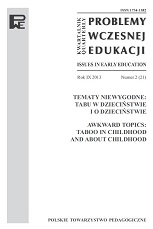Dzieci „czarownicy” – „zaczarowane” dzieci. Społeczne tabu, które powraca
„Sorcerer – children“ – „enchanted children“. A returning social tabu
Author(s): Urszula Markowska-ManistaSubject(s): Social Sciences
Published by: Polskie Towarzystwo Pedagogiczne
Keywords: sorcerer children; taboo; poverty; child; childhood; everyday life of children
Summary/Abstract: The text discusses the situation of children, accused of practicing magic by their close or distant relatives, neighbours, or other individuals, which leads to them being stigmatized in their living environments in benin, Nigeria and Democratic Republic of Congo. Accusations or suspicions of witchcraft, including parents accusing, abandoning or killing their own children, pronounced as ‚witches‘ (‚bana bandoki‘), is an internal tabu in certain traditional African communities, where the belief in wizardry and magic constitutes an important part of the worldview. The issue of witchcraft accusations, pronouncing children as ‚enchanted‘ and turning them into scapegoats, has been resurfacing in recent years, due to progressing poverty in the countries of central and eastern Africa. In addition, the emergence of numerous false ‚healers/priests‘ has become a noticeable problem. These individuals take advantage of religion (which, in countries such as benin, Nigeria or the Democratic Republic of Congo, is a significant, integral part of the cultural life), as a basis for experimental methods of‚ releasing‘ children from the power of ‚evil spirits‘, which, in turn, provides them a source of income and a means of exerting power over local communities.
Journal: Problemy Wczesnej Edukacji
- Issue Year: IX/2013
- Issue No: 2 (21)
- Page Range: 53-64
- Page Count: 12
- Language: Polish

